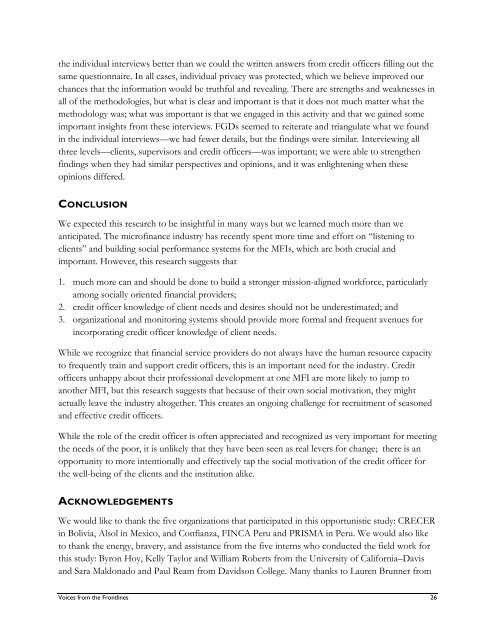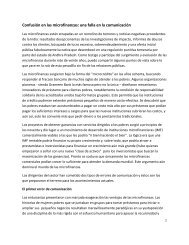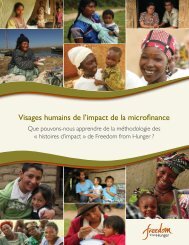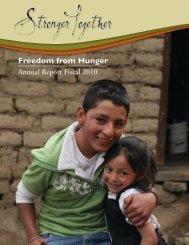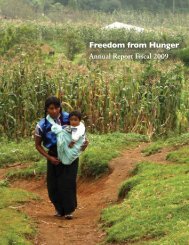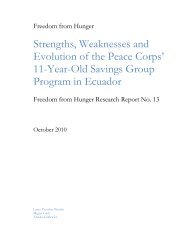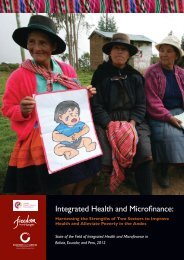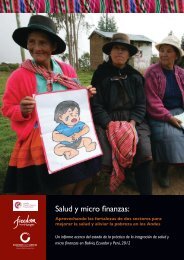Voices from the Frontlines: - Freedom from Hunger
Voices from the Frontlines: - Freedom from Hunger
Voices from the Frontlines: - Freedom from Hunger
Create successful ePaper yourself
Turn your PDF publications into a flip-book with our unique Google optimized e-Paper software.
<strong>the</strong> individual interviews better than we could <strong>the</strong> written answers <strong>from</strong> credit officers filling out <strong>the</strong><br />
same questionnaire. In all cases, individual privacy was protected, which we believe improved our<br />
chances that <strong>the</strong> information would be truthful and revealing. There are strengths and weaknesses in<br />
all of <strong>the</strong> methodologies, but what is clear and important is that it does not much matter what <strong>the</strong><br />
methodology was; what was important is that we engaged in this activity and that we gained some<br />
important insights <strong>from</strong> <strong>the</strong>se interviews. FGDs seemed to reiterate and triangulate what we found<br />
in <strong>the</strong> individual interviews—we had fewer details, but <strong>the</strong> findings were similar. Interviewing all<br />
three levels—clients, supervisors and credit officers—was important; we were able to streng<strong>the</strong>n<br />
findings when <strong>the</strong>y had similar perspectives and opinions, and it was enlightening when <strong>the</strong>se<br />
opinions differed.<br />
CONCLUSION<br />
We expected this research to be insightful in many ways but we learned much more than we<br />
anticipated. The microfinance industry has recently spent more time and effort on “listening to<br />
clients” and building social performance systems for <strong>the</strong> MFIs, which are both crucial and<br />
important. However, this research suggests that<br />
1. much more can and should be done to build a stronger mission-aligned workforce, particularly<br />
among socially oriented financial providers;<br />
2. credit officer knowledge of client needs and desires should not be underestimated; and<br />
3. organizational and monitoring systems should provide more formal and frequent avenues for<br />
incorporating credit officer knowledge of client needs.<br />
While we recognize that financial service providers do not always have <strong>the</strong> human resource capacity<br />
to frequently train and support credit officers, this is an important need for <strong>the</strong> industry. Credit<br />
officers unhappy about <strong>the</strong>ir professional development at one MFI are more likely to jump to<br />
ano<strong>the</strong>r MFI, but this research suggests that because of <strong>the</strong>ir own social motivation, <strong>the</strong>y might<br />
actually leave <strong>the</strong> industry altoge<strong>the</strong>r. This creates an ongoing challenge for recruitment of seasoned<br />
and effective credit officers.<br />
While <strong>the</strong> role of <strong>the</strong> credit officer is often appreciated and recognized as very important for meeting<br />
<strong>the</strong> needs of <strong>the</strong> poor, it is unlikely that <strong>the</strong>y have been seen as real levers for change; <strong>the</strong>re is an<br />
opportunity to more intentionally and effectively tap <strong>the</strong> social motivation of <strong>the</strong> credit officer for<br />
<strong>the</strong> well-being of <strong>the</strong> clients and <strong>the</strong> institution alike.<br />
ACKNOWLEDGEMENTS<br />
We would like to thank <strong>the</strong> five organizations that participated in this opportunistic study: CRECER<br />
in Bolivia, Alsol in Mexico, and Confianza, FINCA Peru and PRISMA in Peru. We would also like<br />
to thank <strong>the</strong> energy, bravery, and assistance <strong>from</strong> <strong>the</strong> five interns who conducted <strong>the</strong> field work for<br />
this study: Byron Hoy, Kelly Taylor and William Roberts <strong>from</strong> <strong>the</strong> University of California–Davis<br />
and Sara Maldonado and Paul Ream <strong>from</strong> Davidson College. Many thanks to Lauren Brunner <strong>from</strong><br />
<strong>Voices</strong> <strong>from</strong> <strong>the</strong> <strong>Frontlines</strong> 26


